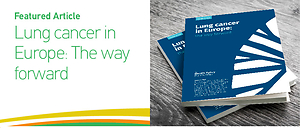Lung cancer causes more deaths than any other cancer, but for too long, it has not been given the policy attention it deserves. Lung cancer is the main cause of cancer-related deaths in Europe1, and its burden will remain high for several decades to come. Even though smoking rates are gradually declining2, people who used to smoke remain at high risk of lung cancer for many years after quitting3, and environmental factors such as air pollution are a growing cause of lung cancer in the entire population4.
We have the means to reduce the burden of lung cancer on our society, but it will require a comprehensive and integrated approach. Importantly, we need to dispel the perception that lung cancer is a self-inflicted condition. We could start by treating smoking as an addiction and reducing stigma towards both smoking and lung cancer. Early detection needs to be enhanced by implementing largescale screening programmes that target high-risk individuals, alongside smoking cessation programmes. The evidence is clear that screening high-risk individuals using low-dose computed tomography scans offers a safe and effective way to shift diagnosis to earlier stages and reduce mortality from lung cancer5,6. Complementary approaches, such as incidental pulmonary nodule identification, management protocols and rapid referral pathways from primary to secondary care, are also important to improve early detection7,8. Improvements to lung cancer care pathways are needed to ensure all people have access to multidisciplinary care that encompasses specialist diagnosis, personalised treatments, and palliative and survivorship care7,8. Finally, targeted efforts are required to reduce geographical and socioeconomic disparities in access and outcomes9,10.
Making these changes can deliver benefits beyond lung cancer. Targeted screening programmes offer the opportunity for early detection of other non-communicable diseases (NCDs), such as chronic obstructive pulmonary disease and some forms of heart disease11-13. Tackling lung cancer can help countries progress towards reducing the overall burden of NCDs on their societies and contribute to greater health system sustainability.
With the implementation of Europe’s Beating Cancer Plan and as we look to post-COVID recovery, we have the opportunity to put in place what is needed to improve outcomes for people with lung cancer and reduce the burden the condition poses on our societies. Lung cancer has, for too long, been denied due attention as a public health priority. The time to act is now.


